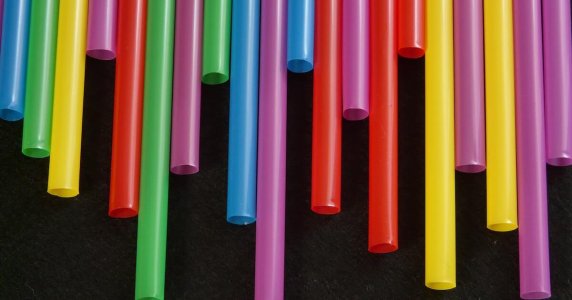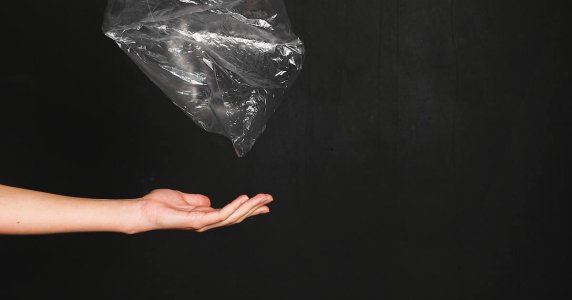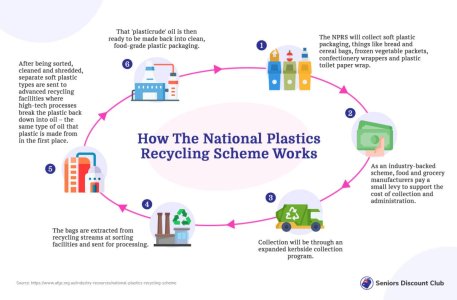New trial changes for yellow bins and how it affects your weekly rubbish routine
- Replies 7
Big changes are coming to select yellow bins in Australia, and it may affect your weekly rubbish routine.
Soft plastics, like carrier bags and scrunchable plastic packaging, may soon be allowed in yellow-lid recycling bins due to sweeping changes after the collapse of the REDCycle program.
We all know the importance of proper waste management and recycling, which is why when the REDCycle program was introduced, many looked forward to joining the initiative.
However, the scheme collapsed in November last year after it was revealed that millions of bags and other soft plastic items – which were dropped off by supermarket shoppers – were secretly stockpiled in warehouses and not recycled.
Now, there’s a new movement towards soft plastics being able to go into yellow bins so they can be processed into packaging.
Now, recycling company RecycleSmart has resurrected its own separate free soft plastics collection pick-ups from homes in some council areas, such as North Sydney. For a full list of council areas, check out their website here.
Once collected, the soft plastics will be compacted and stored at consolidation points until there are enough pallets to fill a truck.
‘The pallets will then be transported directly to APR Plastics facility in Victoria and will be recycled right here in Australia,’ they stated.
Another Australian recycling company, Curby, is also leading the push for this new initiative. Curby allows people to put soft plastics using special yellow bags and tags, which can then go into kerbside yellow bins to be recycled.
The tagged bags can be easily identified and removed during processing and then redirected to special recycling plants that could turn them into food-grade plastic.
This program has already conducted trials that helped them build more solutions to ‘measurably achieve’ their goals. According to their website, these trials helped to increase their recycling rates for soft plastics by 44 per cent.
Curby has previously operated the scheme on the NSW Central Coast, Tamworth and Newcastle council areas.
The Australian Food and Grocery Council developed the National Plastic Recycling Scheme to take ‘hard-to-recycle’ soft plastic packaging and give it a ‘new life’.
The project is now being trialled in six council areas in Victoria and South Australia. Around 10,000 households in Adelaide, Melbourne, Albury and the Macedon Ranges have also joined the initiative and have been throwing their soft plastics in yellow recycling bins.
This comes after reports that supermarket giants ALDI, Coles, and Woolworths announced their joint ‘roadmap to restart’ plan to resume soft plastic collection and recycling earlier last month.
According to the joint plan, the supermarkets will look to export the stockpiled materials left behind by the failed REDCycle program to recycling plants overseas. They also promised to deliver transparency, traceability, and government approvals to their stakeholders – something that the REDCycle program failed to do. You can read more about this report here.
Tanya Barden, the CEO of the Australian Food and Grocery Council, now hopes to make it easier for consumers to recycle their soft plastics.
‘We looked at return-to-store options, but we need to make it convenient and cost-effective,’ she told reporters.
Ms Barden continued: ‘We’re building a whole new supply chain. It will gradually grow as capacity develops. They are currently working with Nestle to recycle the soft plastic, breaking it down into “plasticrude” oil, to create new plastic wrappers for KitKat biscuits.’
However, the plan is limited because of capacity issues of the existing recycling plants. Ms Barden also stated that even at REDCycle’s peak, they were only able to recycle an estimated two per cent of the country’s soft plastic waste.
‘There’s a huge amount of complexity involved in designing a collection scheme. Now we have to scale this up, and we have the industry behind us,’ Ms Barden shared.
‘We’re building a whole new supply chain. It will gradually grow as capacity develops.’
Darren Thorpe, Managing Director of APR Plastics – the company that is partnered with RecycleSmart – said that capturing soft plastics in ‘sufficient’ volumes is crucial for the domestic and advanced recycling industry.
‘There is enormous demand for recycled food-grade plastics from manufacturers, not just here but around the world,’ Mr Thorpe said.
‘We have the technology to do that, and these trials are shaping a scalable model that will enable the creation of a sustainable and efficient advanced recycling industry for soft plastics here in Australia.’
 What are your thoughts on this story? Are you excited about this initiative? Do you have tips and tricks for reducing the use of soft plastic? Let us know in the comments below!
What are your thoughts on this story? Are you excited about this initiative? Do you have tips and tricks for reducing the use of soft plastic? Let us know in the comments below!
Soft plastics, like carrier bags and scrunchable plastic packaging, may soon be allowed in yellow-lid recycling bins due to sweeping changes after the collapse of the REDCycle program.
We all know the importance of proper waste management and recycling, which is why when the REDCycle program was introduced, many looked forward to joining the initiative.
However, the scheme collapsed in November last year after it was revealed that millions of bags and other soft plastic items – which were dropped off by supermarket shoppers – were secretly stockpiled in warehouses and not recycled.
Now, there’s a new movement towards soft plastics being able to go into yellow bins so they can be processed into packaging.
Now, recycling company RecycleSmart has resurrected its own separate free soft plastics collection pick-ups from homes in some council areas, such as North Sydney. For a full list of council areas, check out their website here.
Once collected, the soft plastics will be compacted and stored at consolidation points until there are enough pallets to fill a truck.
‘The pallets will then be transported directly to APR Plastics facility in Victoria and will be recycled right here in Australia,’ they stated.
Another Australian recycling company, Curby, is also leading the push for this new initiative. Curby allows people to put soft plastics using special yellow bags and tags, which can then go into kerbside yellow bins to be recycled.
The tagged bags can be easily identified and removed during processing and then redirected to special recycling plants that could turn them into food-grade plastic.
This program has already conducted trials that helped them build more solutions to ‘measurably achieve’ their goals. According to their website, these trials helped to increase their recycling rates for soft plastics by 44 per cent.
Curby has previously operated the scheme on the NSW Central Coast, Tamworth and Newcastle council areas.
The Australian Food and Grocery Council developed the National Plastic Recycling Scheme to take ‘hard-to-recycle’ soft plastic packaging and give it a ‘new life’.
The project is now being trialled in six council areas in Victoria and South Australia. Around 10,000 households in Adelaide, Melbourne, Albury and the Macedon Ranges have also joined the initiative and have been throwing their soft plastics in yellow recycling bins.
This comes after reports that supermarket giants ALDI, Coles, and Woolworths announced their joint ‘roadmap to restart’ plan to resume soft plastic collection and recycling earlier last month.
According to the joint plan, the supermarkets will look to export the stockpiled materials left behind by the failed REDCycle program to recycling plants overseas. They also promised to deliver transparency, traceability, and government approvals to their stakeholders – something that the REDCycle program failed to do. You can read more about this report here.
Tanya Barden, the CEO of the Australian Food and Grocery Council, now hopes to make it easier for consumers to recycle their soft plastics.
‘We looked at return-to-store options, but we need to make it convenient and cost-effective,’ she told reporters.
Ms Barden continued: ‘We’re building a whole new supply chain. It will gradually grow as capacity develops. They are currently working with Nestle to recycle the soft plastic, breaking it down into “plasticrude” oil, to create new plastic wrappers for KitKat biscuits.’
However, the plan is limited because of capacity issues of the existing recycling plants. Ms Barden also stated that even at REDCycle’s peak, they were only able to recycle an estimated two per cent of the country’s soft plastic waste.
‘There’s a huge amount of complexity involved in designing a collection scheme. Now we have to scale this up, and we have the industry behind us,’ Ms Barden shared.
‘We’re building a whole new supply chain. It will gradually grow as capacity develops.’
Darren Thorpe, Managing Director of APR Plastics – the company that is partnered with RecycleSmart – said that capturing soft plastics in ‘sufficient’ volumes is crucial for the domestic and advanced recycling industry.
‘There is enormous demand for recycled food-grade plastics from manufacturers, not just here but around the world,’ Mr Thorpe said.
‘We have the technology to do that, and these trials are shaping a scalable model that will enable the creation of a sustainable and efficient advanced recycling industry for soft plastics here in Australia.’
Key Takeaways
- Soft plastics may soon be allowed in yellow-lid recycling bins due to potential changes after the collapse of the REDCycle programme.
- Recycling companies, such as Curby, are incorporating soft packaging into existing council recycling bin collections using specially-tagged yellow plastic bags.
- The National Plastic Recycling Scheme, developed by the Australian Food and Grocery Council, is trialling the system in six council areas in Victoria and South Australia.
- The recycling process involves breaking down soft plastic into 'plasticrude' oil, which is then made back into clean, food-grade plastic packaging.










